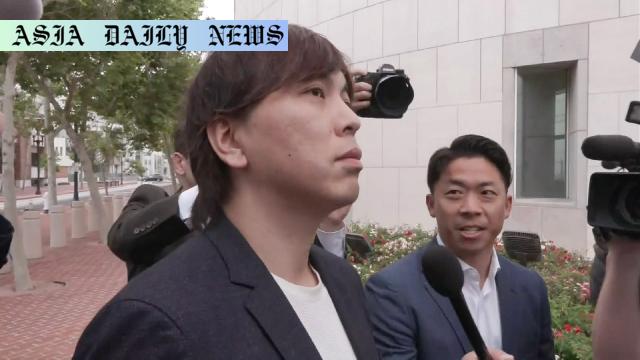Mizuhara faces jail term and restitution for bank fraud and tax evasion involving MLB star Ohtani Shohei’s finances.

Introduction: The Betrayal of Trust
Mizuhara Ippei, once a trusted interpreter for Major League Baseball star Ohtani Shohei, is facing serious legal consequences. Prosecutors in the United States have recommended a prison sentence of 57 months following Mizuhara’s involvement in a bank fraud and tax evasion case that defrauded Ohtani of nearly $17 million. This betrayal of trust has sent shockwaves through the sports community, given the respected relationship between the two.
The Charges Against Mizuhara
According to court documents, Mizuhara was charged with bank fraud and filing a false tax return. Prosecutors revealed that he had illicitly transferred approximately $17 million from Ohtani’s bank account. These funds were reportedly used for personal expenses, including the purchase of luxury baseball cards and other indulgences. Further compounding his fraudulent behavior, Mizuhara allegedly funneled winnings from illegal gambling activities into his personal account, thereby evading transparency and heightening his culpability.
The Potential Sentence and Restitution
The prosecution recommended a multi-pronged punishment: a 57-month imprisonment term, restitution payments amounting to $16.9 million to Ohtani, and an additional $1.1 million to the Internal Revenue Service. Prosecutors emphasized the severity of Mizuhara’s actions, asserting that his criminality was rooted in greed rather than any mitigating factors, like addiction or compulsive behavior. Combined with three years of supervised release, the suggested penalties aim to reflect the gravity of his offense.
Ohtani Shohei: The Victim’s Perspective
The court documents also included arguments from prosecutors about the emotional and financial toll inflicted upon Ohtani, branding him as “truly a victim” of Mizuhara’s actions. The betrayal, they argued, extended beyond dollars and cents, causing harm to Ohtani’s trust and peace of mind. Given that Ohtani is a global sports icon, the revelation of such deceit is likely to serve as a cautionary tale about placing trust in those closest to one’s professional circle.
The Plea Deal and Reduced Sentence
In June 2024, Mizuhara reached a plea agreement with prosecutors by admitting guilt to the charges. This admission, while reducing his potential sentence, has not absolved him of responsibility. Prosecutors accentuated that his actions demeaned the trusted position he held and showcased a clear pattern of manipulation. As a result, the prosecution maintains their recommendation of a term within the sentencing guidelines to address both punitive and restorative justice.
A Legal Reminder About Financial Misconduct
While this case primarily involves a high-profile sports figure and his interpreter, its lesson applies universally. Financial fraud, particularly instances targeting individuals in positions of trust, carries both severe legal and reputational consequences. Mizuhara’s case underlines that greed-driven offenses will not only result in hefty financial restitutions but also extended prison time, perimeters aimed at deterring similar actions in the future.
Conclusion
The sentencing of Mizuhara Ippei, scheduled for February 6, is expected to set a precedent for how authorities handle financial misconduct within the realm of professional sports and personal relationships intertwined with career advancement. While Ohtani continues to thrive as a Major League Baseball superstar, this chapter incidentally serves as both a cautionary tale and a firm reminder of the importance of vigilance in safeguarding personal assets.
Commentary
Reflections on Trust and Financial Misconduct
The story of Mizuhara Ippei serves as an unfortunate but acute reminder of how trust can be exploited in relationships, whether personal or professional. Ohtani Shohei, a global sports icon and an undeniable talent, placed his confidence in his former interpreter, only to have it shattered by greed-driven actions. This betrayal is especially poignant, given the immense trust demanded in such close professional collaborations.
The Role of Greed in Ethical Violations
Greed, as highlighted by the prosecution, is at the heart of Mizuhara’s misdeeds. The use of Ohtani’s financial resources for frivolous indulgences and illegal betting underscores the depth of the financial betrayal. It’s worth noting that this case spotlights the broader issue of financial exploitation, an unfortunate risk many high-profile individuals face when dealing with trusted intermediaries.
Accountability and Restitution
While Mizuhara’s plea deal and subsequent reduced sentence will bring some closure to this chapter, the damage done appears to extend beyond the financial arena. The prosecutors’ call for restitution and a significant jail term is not only about punishing the crime but also about vindicating the victim’s trust and sending a strong signal to others who might contemplate similar actions.
Lessons for All
This case should serve as a learning opportunity for individuals and organizations alike. Building a robust system of checks and balances is crucial to guarding against financial fraud. Accountability structures, even for highly trusted roles, are crucial in safeguarding finances and trust. Ultimately, Mizuhara’s actions serve as a cautionary tale—one that reminds us all of the high personal cost of greed and betrayal.


